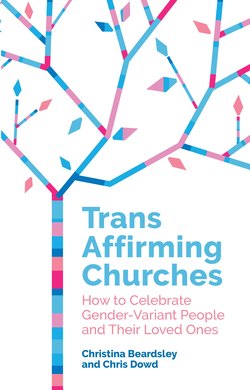Читать книгу Trans Affirming Churches - Chris Dowd - Страница 17
На сайте Литреса книга снята с продажи.
Meet Abi:
ОглавлениеI’m Abi and I’ve been an Evangelical Christian since my late teens, so it took many years to realise that Deuteronomy 22.5 was not directed at trans people at all. My school, of which I’m proud to be an old boy/girl, was Evangelical in ethos. As an adult and a middle-class professional, I am also somewhere in the middle as far as my gender identity is concerned. Part of my life is lived as male, and part as female; I describe myself as bigender. That can be difficult for the people around me to accept, but it isn’t difficult for me. I had to hide the female ‘me’ for far too long, but now I am free to live comfortably in both gender roles.
Being someone who has no desire to transition to female comes with its own problems. People sometimes say to me, ‘We find your situation very confusing, but if you were to transition, it would be much easier to accept you.’
When I did ‘come out’ to my church the reaction from the vicar and many in the congregation was very condemning and they wrote letters to me and my wife to show the strength of their feelings. I’d had a leadership role in the church as a PCC (Parochial Church Council) member, singer/songwriter and worship leader, but all that came to an end following my disclosure. My wife and I had no alternative but to leave the church. It was the place where we had met, married, and served God for several decades. Our bishop was very helpful and pointed us to a more welcoming church. After we moved, we settled in well, but the vicar at that time was fairly cautious about the situation and I was not convinced that the warm welcome we had received extended to being able to attend services as Abi. People told me that they would find that very difficult. However, we now have a new vicar who is keen that Abi should be able to come to church, so I have started to do that on an occasional basis, with a variety of reactions. It’s a work in progress, and the vicar shares our vision for a church inclusive of all diversities, not just trans people. And now this has developed into being able to use my music to lead worship in church as Abi – another step along the journey to full acceptance.
It’s great that you’ve met Abi. She’s inspirational: a gifted singer and musician, whose song is one of biblical inclusion. Listening to her we can see that relating to someone who is trans might involve relating to a spouse or loved one as well. This is something that came through very strongly in the workshops we held in preparing this book. Abi’s story also illustrates something we’ve seen already: how important the clergy person or minister can be in determining whether the trans person will be rejected by, merely tolerated by or fully included in their church. David, one of our workshop participants, suggested some questions that they would like to ask a minister before joining their church:
Do you tolerate me, or do you want something...are you interested?
Is this something you’ve thought about before?
Is it something you’re interested in thinking about?
Similarly, Becky, the parent of a trans daughter, explains:
I don’t want Angela to be tolerated in a church. I want her to be warmly welcomed and to become part of a family.
The rejection Abi and her wife experienced became a wound that proved difficult to heal. Their bishop behaved as a chief shepherd and guardian by directing them to a church where they were made more welcome. Even this was conditional though as only her male persona was welcome at church. Abi apparently had no place in the ‘holy space’ of church. This experience led her to think about other people who were being marginalised by the church community. She was able to share her vision for inclusion when a new vicar was appointed. This priest was also passionate about justice and acceptance and spent time engaging with Abi. It has made a huge difference in terms of Abi’s sense of belonging to that church and she soon started to attend church services and events. More recently, Abi has been invited to lead the music in worship. She has even written her own song about inclusion. People who hear it are struck by the depth of the words and join in the celebration of unity.
Learning points from Abi’s story
• Trans, short for transgender, is an umbrella term that covers a range of people not simply those who transition to and then live permanently in the gender that matches their gender identity.
• Trans people may carry wounds of rejection inflicted by family, friends and their faith community.
• They have gifts to offer that may have been denied expression in other Christian settings just because they have come out as trans.
• The trans person may be accompanied by their spouse or family who may also need your support: we’ll be saying more about this in Chapter 4.
• A conditional welcome may seem better than rejection but is still conditional.
• If you are not informed about trans people, the arrival of someone trans in your congregation is an opportunity for the ministers and church community to learn and grow.
• The trans person may be able to help the church community gain a fuller vision of what an inclusive church might look like.
